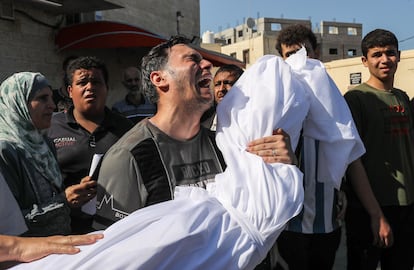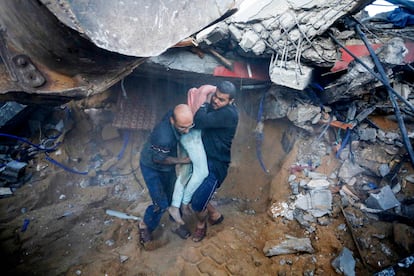Gaza, with 1 million displaced, stares down humanitarian crisis
The evacuation of a bordering city suggests that a ground invasion against Hamas is imminent

“The specter of death is hanging over Gaza. With no water, no power, no food and no medicine, thousands will die. Plain and simple.” That’s how Martin Griffiths, U.N. under-secretary-general for humanitarian affairs, warned on Sunday of the looming humanitarian crisis facing Gaza, where one million people have been displaced. Meanwhile, hundreds of tons of desperately needed aid are piling up in Egypt’s Sinai peninsula.
After meeting in Cairo with Egyptian President Abdel Fattah el-Sisi, U.S. Secretary of State Antony Blinken announced that the Egyptian crossing into Gaza will be reopened this morning for the passage of humanitarian aid. According to Egyptian sources, a truce of a few hours has been agreed for this purpose, although the Israeli government later denied such an agreement.
On Sunday, Israel declared that Gaza’s main highway would be a safe corridor, but for only three hours. The deadline — shorter than the one announced on Saturday by the Israeli army — as well as the official evacuation of the city of Sderot — a regular target of rockets from the Palestinian militias — suggest a land invasion is imminent.
Almost half of the population in Gaza has already abandoned their homes, according to calculations by UNRWA, the U.N. agency for Palestinian refugees, which says the number is likely to rise. Hundreds of thousands of people are in other homes, hospitals or UNRWA schools, which has admitted that for the first time that they cannot guarantee their safety. In some case, they have moved out of fear of the bombings, in other cases, they no longer have a home to return to, with 1,300 building in Gaza destroyed.
The rest of the population — accounting for hundreds of thousands of people — has been fleeing to the south since Friday after Israeli issued its ultimatum. The flight south is dominated by confusion and desperation, amid frequent bombings that increased Sunday from mid-afternoon, as could be heard from Sderot. These attacks have caused 2,670 deaths in eight days, with hundreds of the victims children, according to Palestine’s Ministry of Health. The figure exceeds the death toll from the 2014 offensive — the largest until now — which lasted seven weeks and included a ground invasion.
UNRWA warned that the Gaza population is being forced to use contaminated water from wells, with the consequent risk of disease. It is calling for the immediate supply of fuel to generate drinking water. “It has become a matter of life and death. It is a must,” said Philippe Lazzarini, the head of UNRWA, in a statement. Gaza — which has been under an Israeli blockade for almost two decades, with Egypt also taking part in the hardest period — only has 21% drinking water.
“Attack everywhere”
As the situation deteriorates, Israel warned that a ground intervention was approaching. “Our responsibility now is to enter Gaza, to go to the places where Hamas is preparing, acting, planning, launching [missiles]. Attack them everywhere, every commander, every operative, destroy infrastructure. In one word: win,” Israeli Defense Forces (IDF) Chief of Staff Lt. Gen. Herzi Halevi said while visiting soldiers, which includes more than 300,000 reservists.
“Our responsibility now is to enter Gaza, to go to the places where Hamas prepares, acts, plans and launches [projectiles]. Attack them anywhere, any command, any operation, destroy the infrastructure. In a word, win,” said the Chief of the General Staff, Herzi Halevi, in a speech Sunday to the troops, among which there are more than 300,000 mobilized reservists. “We’re going to do something big, important, to change the situation for a long, long time. This is a great mission, a great privilege. Do it with excellence
On Saturday, Israeli Prime Minister Benjamin Netanyahu asked soldiers: “You ready for the next stage?”
The Egyptian executive reported that it is negotiating the entry of humanitarian aid through Rafah, its border crossing with Gaza, where it fears an avalanche of refugees. Israel is keeping Gaza under “complete blockade”: without food, water, electricity or fuel. Fuel is needed to power Gaza’s only power plant, which also powers the water extraction pumps. But it has stopped working, and only sites with generators have electricity.
Blinken, who is on a regional tour that will take him to Israel on Monday — his second visit since the Hamas attack — said on Sunday in Cairo that Rafah “will be open” for aid to enter. It is also where the exit of foreigners or Palestinians with dual nationality is being negotiated. “We are putting into place — with the United Nations, with Egypt, with Israel, with others — the mechanism by which to get the assistance in and to get it to the people who need it,” said Blinked, according to the Associated Press news agency.

IDF international spokesperson Richard Hecht said Sunday that the evacuation of the north of Gaza is due to the fact that the army is acting “in stages,” not because it is focusing its objectives in the north, where Gaza City is located. Israel has set itself the goal of “destroying” and “overthrowing” Hamas, the Islamist movement that has governed Gaza since 2007. On January 7, the group killed 1,300 Israeli people, mainly civilians, and kidnapped nearly 200.
After the Hamas attack, when a few of the armed men who had infiltrated were still in Israeli territory, Israel began to evacuate about 20 small towns, such as the kibbutzs Beeri and Kfar Aza, the scene of massacres. Most of Sderot’s 30,000 inhabitants have also fled.
Sderot was already a ghost town on Sunday, with businesses closed and more police cars than citizens, but Israeli authorities wanted to evacuate it completely and began the official, voluntary relocation. Buses left at noon from the city’s now empty school and traveled to hotels in Eilat, a tourist city at the tip of the Red Sea, Jerusalem and Tel Aviv. The evacuation is nearly complete, according to authorities. The perimeter will now be extended three and five miles from Gaza. A ground invasion could lead to an increase in rocket fire, which has been significantly reduced in recent days. Israel’s national channel 12 estimates that 60,000 Israelis have had to leave their homes.
The invasion could also trigger a broader conflict. Washington has sent military support (”you may be strong enough on your own to defend yourself, but as long as America exists, you will never, ever have to,” Blinken said last Thursday in Tel Aviv), also in a bid to show its muscle against Iran. The Lebanese militia Hezbollah, backed by Iran and fighting in the Syrian war on the side of forces loyal to President Bashar al-Assad, was involved in clashes last week.
Given this context, Iranian Foreign Minister Hossein Amir-Abdollahian issued a warning on Sunday: “If the Zionist aggressions do not stop, the hands of all parties in the region are on the trigger.”
Sign up for our weekly newsletter to get more English-language news coverage from EL PAÍS USA Edition
Tu suscripción se está usando en otro dispositivo
¿Quieres añadir otro usuario a tu suscripción?
Si continúas leyendo en este dispositivo, no se podrá leer en el otro.
FlechaTu suscripción se está usando en otro dispositivo y solo puedes acceder a EL PAÍS desde un dispositivo a la vez.
Si quieres compartir tu cuenta, cambia tu suscripción a la modalidad Premium, así podrás añadir otro usuario. Cada uno accederá con su propia cuenta de email, lo que os permitirá personalizar vuestra experiencia en EL PAÍS.
¿Tienes una suscripción de empresa? Accede aquí para contratar más cuentas.
En el caso de no saber quién está usando tu cuenta, te recomendamos cambiar tu contraseña aquí.
Si decides continuar compartiendo tu cuenta, este mensaje se mostrará en tu dispositivo y en el de la otra persona que está usando tu cuenta de forma indefinida, afectando a tu experiencia de lectura. Puedes consultar aquí los términos y condiciones de la suscripción digital.









































